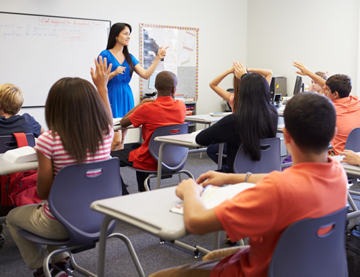Banner Image

This three step process Establish - Maintain - Restore is designed to assist teachers in building stronger student/teacher relationships and help reduce disruptive behavior.
Starting on a Positive Note each School Year.
To establish positive relationships, teachers can:
- Schedule individual meetings with students to get to know them better – this will help ease tensions in the future if you need to give feedback / address disruptive behavior.
- Encourage student-led activities so students feel more invested in their learning
- Welcome students into the classroom at the door with a positive greeting or icebreaker questions.
- Use positive communication techniques such as open-ended questions and compliments help students ease into classroom discussions.
Maintaining Relationships
Teachers can maintain good relationships with their students by continuing to implement the points above, and in addition:
- Take note of positive and negative interactions with students - aiming for a five-to-one ratio.
- Regularly check in with students – ask how they are going and if they need any support.
- Acknowledge good behavior this will help stem negative behavior before it becomes an issue.
Repairing Harm Before Things Get Worse
When relationships need repair, teachers can:
- Let go and start fresh try to avoid holding mistakes over a student’s head. Give them a chance to start each day with a clean slate.
- Take responsibility for their actions - avoid blaming students when things go wrong. Think “What could I have done to avoid the problem in the first place?” Apologize when that’s called for—this will help build trust with students.
- Show empathy. There are two sides to every story - acknowledge that students may have a different perspective to you about what happened.
- Focus on solutions, not problems. Work with students to find a solution that everyone feels is fair.
- Separate the deed from the doer. Criticize the behavior - not the person. If a student is labelled as a “problem student,” they may internalise that label, making it more likely that they’ll repeat the behavior in the future.
The Summary: Effective classroom management starts with teacher / student relationship building. When students feel a sense of belonging, they’re more likely to be academically engaged and act in a positive manner.
Source: https://www.edutopia.org by Youki Terada
To read the article in full visit https://www.edutopia.org/article/key-effective-classroom-management
